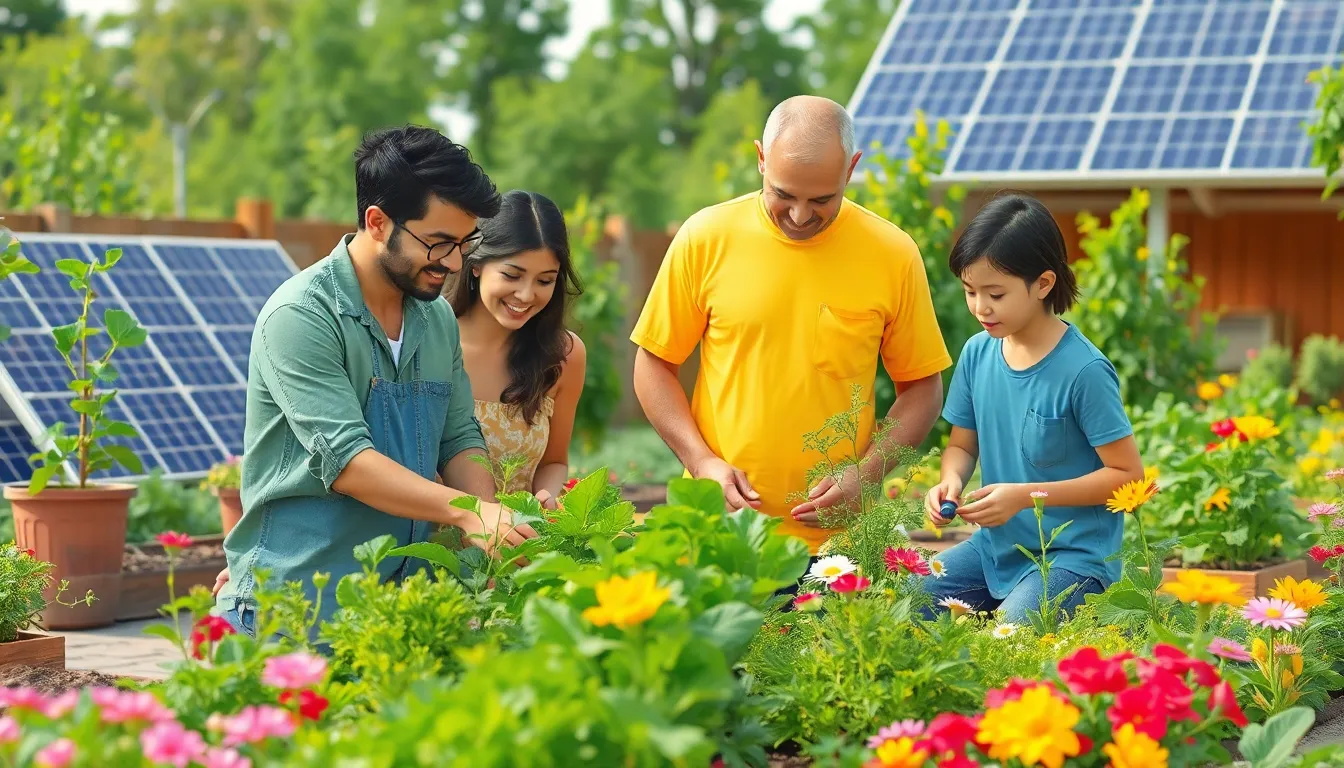In a world where plastic seems to multiply like rabbits and climate change feels like that annoying friend who just won’t leave the party, sustainable living has never been more crucial. It’s not just a trendy buzzword thrown around at eco-friendly brunches; it’s a lifestyle that can save our planet from turning into a giant landfill. Imagine a life where your morning coffee doesn’t come with a side of guilt and your beach trips don’t involve dodging plastic bags like they’re landmines.
Sustainable living isn’t just about hugging trees or wearing hemp clothing (though no judgment here). It’s about making smart choices that benefit both the planet and future generations. By embracing this lifestyle, individuals can reduce waste, conserve resources, and create a healthier environment. So, why not join the movement? After all, who wouldn’t want to live in a world where the air is fresh, the oceans are clean, and the only thing growing is our commitment to a sustainable future?
Table of Contents
ToggleUnderstanding Sustainable Living
Sustainable living refers to adopting practices that minimize environmental impact. Individuals who prioritize sustainability actively reduce their carbon footprint through thoughtful choices. Actions like reducing waste, conserving water, and using renewable energy sources contribute to a healthier planet.
Living sustainably supports biodiversity. It promotes the preservation of ecosystems, ensuring that various species thrive. Sustainable practices help maintain natural habitats and protect wildlife from the adverse effects of pollution and climate change.
Economic benefits arise from sustainable living. Investments in renewable energy create jobs and stimulate local economies. Businesses adopting eco-friendly practices often see cost savings through resource efficiency and waste reduction.
Communities benefit from sustainable practices. Neighborhood initiatives like community gardens foster local food production and encourage social interaction. Sustainable transport options, such as public transit and cycling, enhance connectivity while reducing reliance on fossil fuels.
Education plays a crucial role in promoting sustainable living. Informing individuals about environmental issues encourages them to make informed choices. Schools, universities, and organizations offer programs that raise awareness and inspire action.
Incorporating sustainable living improves personal well-being. Healthier lifestyles result from consuming local organic foods and spending time in green spaces. Additionally, individuals often experience a sense of fulfillment when engaging in activities that benefit the environment.
Sustainable living is critical to addressing global challenges. Collective efforts can significantly reduce pollution and combat climate change. Each person’s commitment to sustainability contributes to a larger, global movement towards environmental stewardship.
The Impact of Sustainable Living

Sustainable living significantly influences environmental health and economic stability. It fosters a holistic approach to addressing pressing global issues.
Environmental Benefits
Sustainable practices reduce greenhouse gas emissions and combat climate change. By minimizing waste, individuals lower pollution levels and enhance air quality. Conserving water leads to healthier ecosystems and preserved biodiversity. Renewable energy sources like solar and wind decrease dependence on fossil fuels. Moreover, these practices contribute to cleaner oceans and improved wildlife habitats, essential for maintaining ecological balance. Through education and community engagement, everyone plays a role in increasing environmental awareness.
Economic Advantages
Adopting sustainable living creates economic opportunities and job growth in emerging green sectors. Renewable energy industries experience significant job increases, offering careers in solar installation and energy efficiency. Local food production enhances the economy, supporting farmers and reducing food transportation costs. Businesses that prioritize sustainability attract customers who prefer eco-friendly products. Additionally, communities benefit from lower costs associated with waste management and energy consumption. Sustainable choices lead to long-term financial savings for individuals and organizations alike.
Challenges of Unsustainable Practices
Unsustainable practices pose significant challenges, threatening both environmental integrity and human well-being.
Climate Change
Climate change results from excessive greenhouse gas emissions, primarily due to fossil fuel use. Deforestation contributes significantly, releasing carbon stored in trees. These actions increase global temperatures, leading to extreme weather events like floods and droughts. According to the Intergovernmental Panel on Climate Change (IPCC), global temperatures could rise by 1.5 degrees Celsius by 2040 if current trends continue. This rise impacts various ecosystems, altering habitats and endangering numerous species. Communities frequently experience economic strain as natural disasters become more prevalent. Adaptation costs rise, impacting infrastructure and agricultural productivity. Increased heatwaves threaten public health, particularly among vulnerable populations. Action towards sustainable practices reduces emissions, fostering a healthier planet.
Resource Depletion
Resource depletion remains a critical issue driven by unsustainable consumption patterns. Over-extraction of natural resources leads to shortages, particularly in water and fossil fuels. According to the World Bank, freshwater resources face significant stress due to population growth and agricultural demands. This situation exacerbates water scarcity in many regions, resulting in conflicts over access. Additionally, rapid deforestation threatens biodiversity and disrupts ecosystems. Fossil fuel extraction also harms local communities, impacting air quality and health. The demand for nonrenewable resources increases, outpacing earth’s capacity for replenishment. Implementing sustainable practices safeguards resources for future generations, promoting balance in consumption and conservation.
Strategies for Sustainable Living
Implementing strategies for sustainable living enhances environmental health and fosters personal well-being. Several practical approaches exist to encourage this lifestyle change.
Reducing Waste
Reducing waste serves as a fundamental principle of sustainable living. Composting organic materials minimizes landfill contributions and enriches soil. Choosing reusable products, such as bags, bottles, and containers, decreases reliance on single-use items. Advocating for recycling increases the lifespan of materials, decreasing the need for new resources. Participating in community clean-up events encourages collective action against litter. Engaging in mindful consumption embodies the idea of only purchasing what is necessary, further cutting down on waste.
Supporting Local Economies
Supporting local economies significantly benefits community sustainability. Purchasing food from local farmers markets improves access to fresh produce while reducing transportation emissions. Collaborating with local businesses stimulates economic growth within the community. Investing in local artisans fosters creativity while promoting environmentally friendly practices. Choosing services that prioritize sustainability strengthens local business chains dedicated to ethical practices. Spreading awareness about local initiatives enhances community engagement, creating a sustainable atmosphere that nurtures economic resilience.
Sustainable living isn’t just a choice; it’s a responsibility that impacts the planet and future generations. By embracing eco-friendly practices, individuals can contribute to a healthier environment and foster economic growth. Every small action counts, whether it’s reducing waste or supporting local businesses.
As more people adopt sustainable habits, the collective effort can lead to significant changes in community resilience and environmental health. The journey toward sustainability is ongoing, but it’s essential for ensuring a thriving planet. Committing to this lifestyle today paves the way for a cleaner, greener tomorrow.




